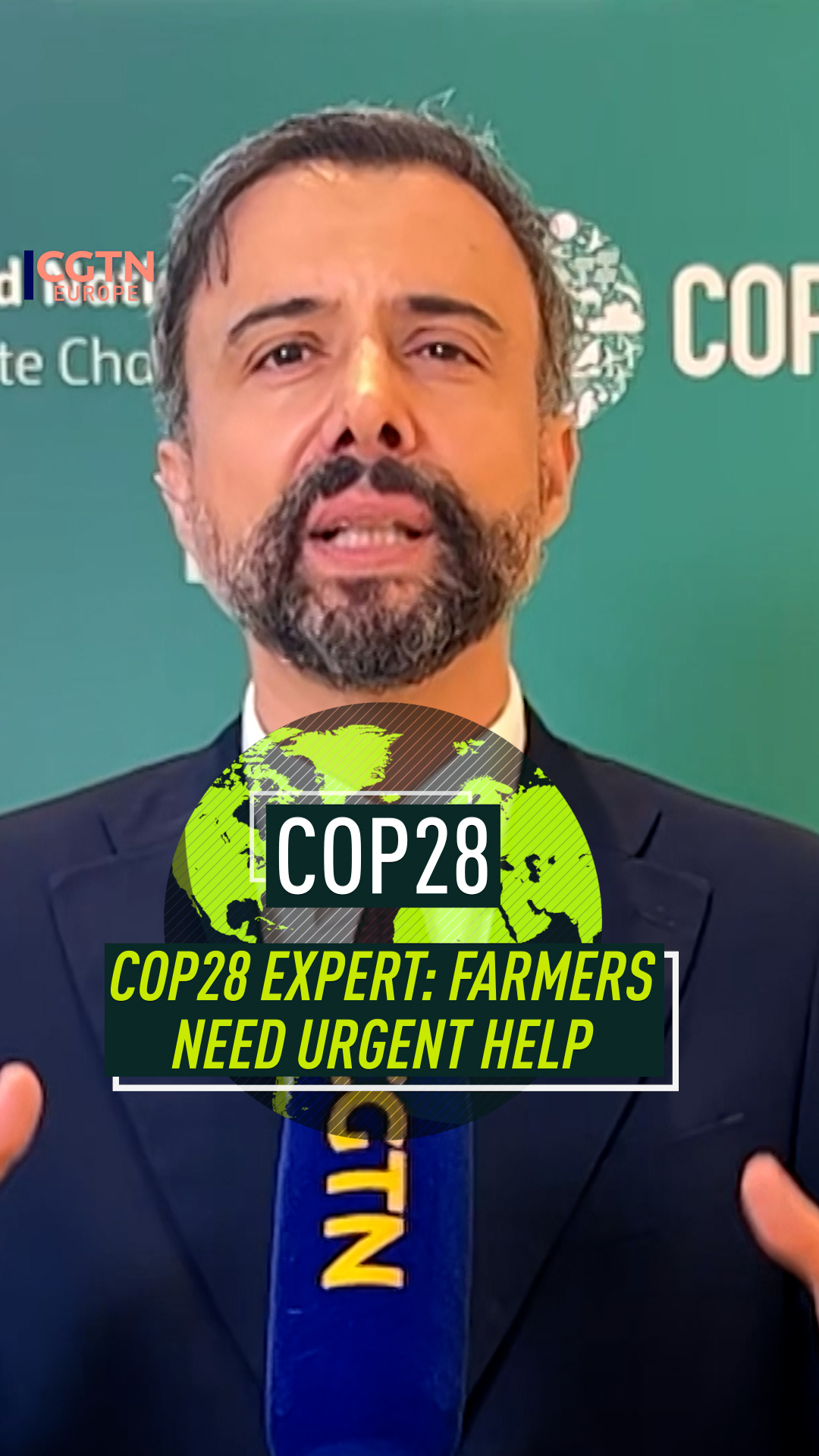00:45

WATCH: COP28 agenda and importance of agriculture discussed on CGTN Europe
The President of the International Fund of Agricultural Development (IFAD) says it is a 'puzzle' as to why increased funding for sustainable agriculture and climate adaptation is not top of the agenda at COP28.
"We know only 0.8 percent of the climate finance is going to small-scale farmers," Alvaro Lario told CGTN Europe. "However, we are talking about hundreds of millions of people who are really, really losing their livelihoods after many of the extreme weather events. So it's a puzzle to us why adaptation is not at the top of the agenda."
Lario's organization is aiming to attract more support at the summit in Dubai and he stressed the urgency of attracting greater investment in line with new initiatives they are working on to help small-scale farmers.
"We talk a lot about mitigation, hard infrastructure, but for that, and especially in developing economies, there's enough financing, especially from the private sector," he added. "In the case of adaptation, we see very, very little financing and even less going to actually agrifood systems.
"So the question is how can we make sure that more and more of that financing is reaching the people and changing the lives, rather than only focusing on the mitigation and on the harder infrastructure?"
Lario insisted it is not as simple as asking people to stop eating beef and lamb, with this summit hailed as the one in which world leaders have been urged to try to phase out fossil fuels. Livestock is not the be-all and end-all in this conversation, he believed.

Sustainable agriculture should be being discussed with more urgency, says Alvaro Lario
Sustainable agriculture should be being discussed with more urgency, says Alvaro Lario
READ MORE:
Burning fossil fuels causes one death every five seconds, says WHO
Murcia's wastewater miracle: How Spanish city recycles 98% of its water
Revolutionary German start-up striding toward plastic-free shoe
"I'm not sure the solution is just to stop livestock as such," he added. "We know that in a lot of the developing economies, one of the key issues is actually that livestock serves both for calorie intake for protein but also in many cases are savings.
"For a lot of the smaller communities, it is not necessarily those that are polluting more and those that are creating the issue. The big issue is how do we transition into an energy whereby many of the developing economies have the financing to invest in renewables? What can we do actually to make sure they do not have to choose between people and planet? So just talking about livestock, it's a very small part of the overall challenge."
With half the world malnourished and half the world obese, according to reports, there's a tricky balance for Lario's organization to focus on, adding that assistance for small-scale farmers is again the goal amid a message which could be lost somewhat in translation.
He said: "It's not an A or B, What is very clear and we have learned over the last years that we need to advocate and to change how we consume so responsible consumption and also how we can actually produce food with nature.

COP28 President Sultan Ahmed Al Jaber addresses the UN Climate Change Conference (COP28) in Dubai./ Thaier Al-Sudani/Reuters
COP28 President Sultan Ahmed Al Jaber addresses the UN Climate Change Conference (COP28) in Dubai./ Thaier Al-Sudani/Reuters
"That means integrating the environment, access to water, soil management, what type of food we are producing, and making sure we are also increasing the ability to produce fruit and vegetables in a sustainable manner in many of the developing economies so they can be food-sustainable in a way that does not depend on many other countries. For that, we need more local production but we need to count more and invest more in the small-scale farmers to achieve that."
Farming and feeding the world produces billions of tonnes of emissions of greenhouse gases every year, around a third of the global total, but some would argue little is being done to address this, including at COP. Much hangs on whether Lario and IFAD secure the finance they are hoping for this month.
Lario added: "There's a dual challenge with agriculture. On one side you have in Africa more than 70 per cent of the production done by small-scale producers. Also in south-east Asia, as you mentioned, one third of the greenhouse emissions are coming from agriculture.
"A lot of it actually is not coming from the small-scale farmers but it's coming from the bigger farms, from the bigger production. What we need to make sure is we are also able to produce food in a resilient matter with the resources we have, with the right water infrastructure, but also with managing soil, diversifying crops. So it's not only what we produce but also how we produce it. We need a lot of investments in sustainable agriculture and on climate adaptation."

Subscribe to Storyboard: A weekly newsletter bringing you the best of CGTN every Friday